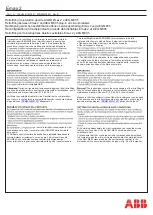
N° Doc.
Doc. No.
Mod.
Rev.
M4379
SACE Emax
601933/003
Aparato
Apparatus
Escala
Scale
N° Pag.
Sh. No.
53/100
12.2 Current sensors
The current sensors are mounted on each phase and give the following
signals:
a) Current signal which guarantees the energy necessary for correct
operation of the protection
b) Current signal required proportional to the phase currents.
The current sensors are characterised by the following rated values:
Rated primary current
250A, 400A, 800A, 1250A, 1600A,
2000A, 2500A, 3200A, 4000A, 5000A
and 6300A
Service frequency
45 - 66 Hz
12.3
Protection functions
In its most complete configuration, the SACE PR111 protection unit
carries out five independent protection functions, of which three (S, I and
G) can be excluded. In particular:
– protection against overload with inverse long time-delay “L”
– protection against short-circuit with inverse or definite short time-delay
“S”
– protection against instantaneous short-circuit “I”
– protection against earth fault “G”
– rapid protection against instantaneous short-circuit “Iinst”
The protection allows processing of the current signal as follows:
– with true effective value up to a current of 2 x In and with a peak factor
≤
3 for the protection function “L”
– with peak value for currents
≥
2 x In and for the protection functions “S”
and “I”
– with peak value for the function “Iinst”
– with average value for the protection against earth fault “G”.
The protection allows processing of the neutral pole current signal as
follows:
– at 50% of the value of the phases (release normally supplied by ABB
SACE)
– at 100% of the value of the phases (version available on request).
12.3.1 Protection against overload with inverse long time-delay (L)
The threshold value of this protection is indicated by I1, whereas the
relative trip time is indicated by t1. This function has 4 protection curves
with inverse long time-delay.
A luminous LED indicator is provided on the front of the unit (fig. 48
ref. B) which lights up during an overload; it turns off when the overload
is over or with the protection tripped.
In the latter case, the circuit-breaker opens by means of the opening
solenoid (OS).
12.3.1.1
Selection of the threshold value (I1)
Setting the L threshold is carried out by working on the 3 dip-switches
shown in fig. 48 ref. A.
The selection made represents the fraction of In corresponding to I1. The
threshold tolerance is in compliance with the 947-2 standard. The
protection cannot be excluded.
8 threshold values are available, defined and set as follows:
12.2
Sensores amperimétricos
Los sensores amperimétricos se encuentran montados en cada fase
y suministran las siguientes señales:
a) Señal amperimétrica que garantiza la energía necesaria para el
funcionamiento correcto de la protección.
b) Señal amperimétrica necesaria proporcional a la corriente de fase.
Los sensores amperimétricos se caracterizan por los siguientes valores
nominales:
Corriente nominal primaria
250A, 400A, 800A, 1250A, 1600A,
2000A, 2500A, 3200A, 4000A, 5000A
y 6300A
Frecuencia de trabajo
45 - 66 Hz
12.3
Funciones de protección
La unidad de protección SACE PR111 ejerce, en la configuración más
completa, cinco funciones de protección independientes de las cuales
tres (S, I y G) se pueden excluir. En particular:
– Protección contra sobrecarga a tiempo largo inverso “L”
– Protección contra cortocircuito a tiempo corto inverso o independiente
“S”
– Protección contra cortocircuito instantáneo “I”
– Protección contra defecto a tierra “G”
– Protección de umbral fijo contra cortocircuito “linst”
La protección permite elaborar la señal amperimétrica de la manera
siguiente:
– con verdadero valor eficaz hasta una corriente de 2 x In y con un factor
de cresta
≤
3 para las funciones de protección “L”.
– con valor de cresta para corrientes
≥
2 x In y para las funciones de
protección “S” e “I”.
– con valor de cresta para la función “linst”
– con valor medio para la función de protección contra defecto a tierra
“G”.
La protección permite elaborar la señal amperimétrica del polo neutro de
la siguiente manera:
– al 50% del valor de las fases (relé normalmente suministrado por ABB
SACE)
– al 100% del valor de las fases (ejecución disponible bajo demanda).
12.3.1 Protección contra sobrecarga a tiempo largo inverso (L)
El valor de umbral de esta protección se indica con I1, mientras que el
tiempo correspondiente de actuación se indica con t1. Esta función
dispone de 4 curvas de protección a tiempo largo inverso.
En el frente de la unidad se ha previsto una indicación luminosa, mediante
LED (fig. 48 ref. B), que se enciende durante una sobrecarga y se apaga
cuando la sobrecarga desaparece o interviene la protección.
En este último caso, el interruptor se abre mediante el solenoide de
apertura (SA).
12.3.1.1
Selección del valor de umbral (I1)
El umbral L se programa mediante los 3 dip-switch indicados en la fig. 48
ref. A.
La selección efectuada representa la fracción de In correspondiente a I1.
La tolerancia en el umbral es conforme con la norma 947-2.
La protección no se puede excluir.
Se encuentran disponibles 8 valores de umbral que se pueden definir y
programar de la siguiente manera:
0.4 x In
0.5 x In
0.6 x In
0.7 x In
0.8 x In
0.9 x In
0.95 x In
1.0 x In
0.4 ... 0.9 x In with steps of 0.1 x In
0.9 ... 1.0 x In with steps of 0.05 x In
0.4 ... 0.9 x In con paso de 0.1 x In
0.9 ... 1.0 x In con paso de 0.05 x In








































